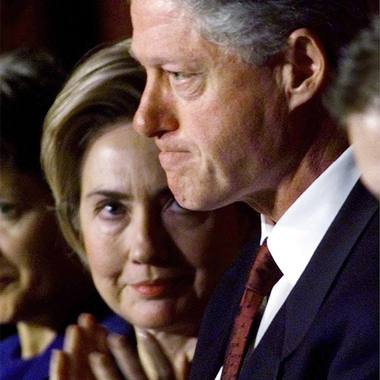The president lies. He manipulates. He is corrupt. He uses his friends and maligns his foes. He drags the White House into swamps of sleaze, fouling American politics in ways none of his predecessors would have dared.
 Outrage follows outrage, but most Americans aren't outraged. Yet. |
He is cheap and shameless and cannot be trusted. Even his defenders know it, know it more acutely with each new scandal. No one wonders any longer about the shape Bill Clinton's "legacy" will take. There is nothing left to wonder about. His legacy is an Augean stable of dishonesty and dissipation, of access-peddling and egregiousness, of high crimes and misdemeanors.
But he is popular.
Or at least, not unpopular. Three-fifths of the public, say the pollsters, approve of the way he is doing his job. To the relief of his supporters and the consternation of his opponents, nothing he does or is charged with doing seems to turn voters against him. Not the illegal fund-raising. Not the renting out of Air Force One and the Lincoln Bedroom. Not the selling of White House "coffees." Not the hush money for convicted underlings. Not the firing (and slandering) of the Travel Office employees. Not the trolling through FBI files. Not the crude come-ons to Paula Jones and Kathleen Willey. Not the oral-sex sessions with young Miss Lewinsky, or the preposterous claim that they never occurred. Not Whitewater, with all its money-laundering, evidence-tampering, and S&L-bilking.
Not even the accusation that the president, countermanding his State and Defense departments, ordered technology critical for nuclear missile accuracy to be sold to China. Or the news that China has targeted 13 nuclear missiles at American cities.
Outrage follows outrage. But most Americans aren't outraged.
Why? Why does nothing seem to weaken the president's standing? How can a politician so besmirched continue to ride high in the polls? Is it really true that Americans don't much care what the president does as long as the economy stays healthy? That his lack of honor doesn't trouble them so long as they agree with his policies?
The national media, the TV networks in particular, have spent five years not getting worked up about the corruption of this administration. Oh, the White House scandal stories have been broken and reported, but for the most part dutifully, not angrily. Journalists convey no sense of shock or revulsion at the president's absence of integrity. They are affronted more by the Republican congressman who calls Clinton a "scumbag" than by the fact that the epithet, though crude, hits home.
This is not just good journalism — reporters and editors putting out the story without letting emotion get in the way. The emotion isn't there. Journalists simply don't have it in for Clinton the way they did for Nixon when the stench of Watergate was abroad. The president's arrogance and cynicism and ethical bankruptcy don't infuriate them. His willingness to cut any corner, to deceive, to sully his office — these register on reporters even as they register on the general public. But not enough to undo his popularity, or to turn them firmly against him.
Yet.
Clinton's fall is coming. It is only a question of when and by what means. House Speaker Newt Gingrich now bluntly identifies the president as the leader of "the party of cover-up and corruption." William Kristol writes in The Weekly Standard that "by October, the issue of Clinton as president will be center stage, to the exclusion of almost everything else." Independent counsel Kenneth Starr will before long conclude his investigation and file his report — and it will be devastating.
Just wait. The tolerance for Clinton and his mass of lies will give way. In retrospect, it will seem amazing that his critics should have had such a hard time getting their message across. Looking back at the 1990s, Americans will marvel that a president so unprincipled and false could have kept up the act for so long.
But public opinion changes slowly. In his celebrated biography of Winston Churchill, The Last Lion, William Manchester points out that the Munich Agreement — despised today as craven — brought huge acclaim to Neville Chamberlain. In the fall of 1938, the British prime minister basked in triumph as "combers of admiration and praise continued to break at his feet." Churchill denounced Chamberlain, but found himself ignored, or derided as a right-wing crank.
The public, writes Manchester, hates to change its political views. "Reluctant to reconsider its convictions, superstitions, and prejudices, it rarely withdraws support from those who are guiding its destinies. Thus inertia becomes an incumbent's accomplice. So does human reluctance to admit error. Those who backed the top man insist, against all evidence, that they made the right choice."
But Churchill kept on, month after month, speech after speech, "hammering on the conscience of the British public." And at last reality sank in. It "became apparent to men in pubs, women pushing prams, greengrocers, drummers, lorry drivers, businessmen, shop stewards; to everyone, in short, except the oligarchy in power, which need not face the voters again for three years. Slowly the prevailing opinion of 50 million Englishmen would turn."
Reality is becoming apparent to Americans, too. Opinion is turning.
Bill Clinton has had a long run. It is going to end in ashes.
(Jeff Jacoby is a columnist for The Boston Globe).
-- ## --
Follow Jeff Jacoby on Twitter.
Discuss his columns on Facebook.
Want to read more? Sign up for "Arguable," Jeff Jacoby's free weekly email newsletter.

